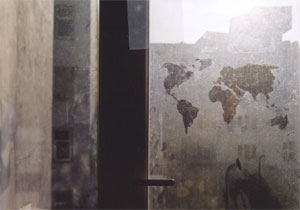
Born in 1971 in Fribourg (CH)
Lives and works in Zurich (CH)

2001-2003
Colour photographs, cibachrome prints
50 x 75 cm chacune
Year of Purchase: 2005
What makes Isabelle Krieg’s practice different is the way she draws on everyday items and extrapolates private ad minima stories. Household or studio objects assembled with branches in the form of a stream as in Curriculum (2004), titles evoking a personal world subjected to sugary infantilization (Voie lactée, Shaumschauen, Maman … ), this is a return to the readymade in the most sensuous, poetic sense.
With Découvrir le monde (Discovering the World) we again find this same mode of visual and verbal solicitation. For this set of photographs, the world’s contours have been discreetly drawn on various supports: a decrepit floor, a slashed poster on the wall, a windowsill. The form of this work wavers between several methods: shortlived, almost immaterial interventions, assisted ready-mades, and also some very meticulously composed photographs. We could quote the introspective shots taken from their window by Joseph Sudek and André Kertesz, the one because he lost full use of his bodily movements, the other because he loses himself in world-weariness in New York, far from his sorely-missed Paris and Europe. But in the terminology of Roland Barthes, with Isabelle Krieg, the studium and punctum of the picture merge together. The world map is placed, if not in the foreground, at least always at a strategic point or on a strategic line of the image. The eye is thus caught up in a swirl of diffuse signs and you never know what to look at first; is it a bicycle with the handlebars decorated with branches in the top right-hand corner of the picture? The abstraction formed by the planisphere on one wall with layers of coloured paint revealed as they peel off ? Or alternatively a traffic sign on a lamppost erected amid the play of urban lines seen through a window, on the sill of which is that visual identifier used throughout the series? And the title of the images plays on this same ambiguity: discover the world, like some slogan overworked by both the multinational corporations and the new small global operators (including the contemporary arts sphere and ‘world’), and also uncover the world, as to look at the world in its minutest, including its most interstitial, details. The two in fact are not contradictory, although the former sense appears slightly ironical. Far from the myth of globalization standardizing the visible face of the globe, these photographs seem to be so delicately calling for contemplation of a peripheral, intimist vision of fragility.
Frédéric Maufras